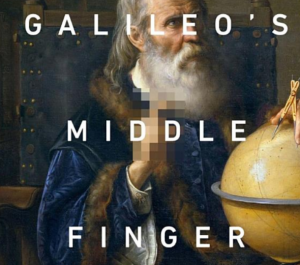Alice Dreger’s newest book is essentially a memoir, a record of her personal experiences as an activist and an academic. Much of the time, she acts as social justice advocate, assailing the medical establishment for various ethical shortfalls, such as failing to provide patients with the opportunity to exercise fully informed consent prior to life-altering irreversible procedures. The rest of the time she acts as an historian, documenting social justice attacks on various scientists who displayed too much of what she calls the “Galilean personality,” that is, a tendency to give the finger to prevailing social norms while standing firm in the belief that the quest for scientific truth is too sacred to sugarcoat for public consumption.
 Writing in her historical capacity, Dreger provides a firsthand account of a “fraternity of beleaguered and bandaged academics who had produced scholarship offensive to one identity group or another and who had consequently been the subject of various forms of shout-downs.” As an academic feminist in the humanities, she had been trained to think of these “white straight male scientists accused of producing bad and dangerous findings” as “soldiers in the oppressive establishment against which…good guys has come to fight” but over time she comes to see them as people who “very much cared about progress in social justice” but who “cared first about knowing what was true.”
Writing in her historical capacity, Dreger provides a firsthand account of a “fraternity of beleaguered and bandaged academics who had produced scholarship offensive to one identity group or another and who had consequently been the subject of various forms of shout-downs.” As an academic feminist in the humanities, she had been trained to think of these “white straight male scientists accused of producing bad and dangerous findings” as “soldiers in the oppressive establishment against which…good guys has come to fight” but over time she comes to see them as people who “very much cared about progress in social justice” but who “cared first about knowing what was true.”
Some of the more controversial figures discussed in the book include J. Michael Bailey, Craig Palmer, Napoleon Chagnon, and Maria New, all of whom have been at the center of academic controversies large enough to bleed over into mainstream awareness. You may have heard about some of these people and events before, but probably not in a particularly humanising way. This book makes these monsters of privilege into real people, which was bound to get her into trouble with the activist crowd.
As it turns out, Dreger’s penchant for courting scientific controversy in gender studies has earned her a small place on the Atheism Plus Block Bot list:
@theblockbot #block #storify +AliceDreger http://t.co/8482MumpKW
— M. A. Melby (@mamelby@indieauthors.social) (@MAMelby) August 31, 2015
https://twitter.com/MAMelby/status/638147420765839360
This is woefully ironic, given that Dreger fluently speaks the language of privilege and oppression and spends a significant portion of the book detailing her activism on behalf of intersex children and their mothers. One must suppose that no amount of striving for social justice in real life can make up for dogmatic missteps where the cult of A+ is concerned.
Dreger’s book provides excellent firsthand accounts of how activists interact with scientists, both for good and ill. She contrasts a measured and ethical approach to lobbying the scientific establishment for change with the politics of personal destruction and character assassination directed at those who have strayed outside of politically palatable discourse. Ultimately, she concludes that “Science and social justice require each other to be healthy, and both are critically important to human freedom.” But they can only work together productively under the shared assumption that we are all working towards truth:
Truth and justice cannot exist one without the other. When one is threatened, the other is harmed. Justice, and thus morality, require the empirical pursuit. I want to say to activists, if you want justice, support the search for truth. Engage in searches for truth. If you really want meaningful progress, and not just temporary self-righteousness: Carpe Datum.
This is a rationalist message which must be taken to heart in a world where public shaming can subvert and subsume peer review, where feelings too often trump findings.
Share and enjoy!
